There may be spoilers.
Director: Woody Allen
Screenplay: Woody Allen
Starring: Mia Farrow, Jeff Daniels and Danny Aielo
Images are from the 2001 MGM DVD
And my heart beats so that I can hardly speak;
And I seem to find the happiness I seek
When we're out together dancing, cheek to cheek.
Heaven, I'm in Heaven,
And the cares that hang around me thro' the week
Seem to vanish like a gambler's lucky streak
When we're out together dancing, cheek to cheek.
When Fred Astaire sang "Cheek to Cheek" while dancing with Ginger Rogers in Top Hat, I bet he didn't realize how well it described the movie experience and the bittersweet reality of temporary happiness. Woody Allen did, and he bookends The Purple Rose of Cairo with it, to remind us that the verisimilitude of illusion is fleeting, and that fiction is both a sanctuary and an emotional limbo.
To an extent, I am reminded of my favorite Alfred Hitchcock film, Rear Window. They both have movies as their underlying theme. The distinction between the two films is that Mr. Hitchcock's explores the nature of voyeurism and makes implications to its relationship with movie watching. Mr. Hitchcock questions the difference between reality and illusion (real voyeurism vs. fictional voyeurism), whereas Mr. Allen's film focuses on a much more affecting dilemma. How much should we allow illusion to intrude into our real lives? It's a question I battle with often. Somedays, I work my way through 5 feature films (10 hours) in an effort to stave off depression and boredom. For the latter, it works quite well. But for depression, it can be a deathtrap.
Many of us turn to movies when we are depressed, but when you're on the bottom rung, is it wise to trade your time in reality for fiction? After all, time is the most precious commodity we waste.
It is the Great Depression, and we meet Cecilia, a waitress who's life consists of supporting her unemployed oaf of a husband Monk, going to the movies, and breaking dishes at work because her mind's on the movies. I don't think there's a character as empathetic as she is, because she is the audience:
The silver screen is her window of escape, but ultimately, she can't climb through. Her husband, Monk, spends his time asking her for money, playing craps, demanding she cook dinner, and with prostitutes, which Cecilia is aware of:
The question of why she doesn't get out is easy to answer: where else can she go? She packs her bags:
But she's stuck. Escape from reality is ultimately impossible. So what does she do?
She sees the new film "The Purple Rose of Cairo" and watches it again and again and again. It's one of those films from the '30s that involves people who live in penthouses like this one:
And, on a boredom-inspired whim, decide to take a trip to Cairo, where they meet Tom Baxter, an explorer who always sports his pith helmet:
So, after the umpteenth viewing, something happens. Tom figuratively breaks the fourth wall to talk to Cecilia, who he's noticed during all his performances that day:
Then, he literally breaks the fourth wall and steps out into the real world:
The rest of the cast members are stuck. When the story is interrupted, what can they do? Their characters are written a certain way and they can't improvise the story without Tom. There are many humorous scenes involving the cast members. The maid comes in the room and says: "I'm not supposed to be on 'til reel 6!" or how the audience members start arguing with the cast.
The impossibility of breaking the fourth wall is best not questioned in the film. The film moves at such a swift pace in the first place that it's difficult to even gather any logic beyond saying: "What?!"
I think the beginning and the end of The Purple Rose of Cairo (the one starring Mia Farrow) are marked by bleak reality. The middle is where there's the most fun, such as Tom and Cecilia trying to get away in a car after dining and dashing:
Of course, in the movies, people don't need keys. They just hop in and the car starts up. The madcap structure of reality-to-escape-and-back-to-reality can be seen as an allegory for our own movie experience. It takes a while for us to sink in and detach ourselves from reality. When we watch a movie, our minds become entirely focused on it and we become unaware of our surroundings, only what's on screen. What most people are able to do is return to reality safely, and not get caught up in the fictional world.
Eventually, reality has to hit this crazy situation, in the form of Gil Shepherd, the actor who created Tom. He meets Cecilia in the hopes that she will coerce Tom into returning to the screen. He woos her, and for a time, it seems like he might really be sincere.
Hats, of course, are a great prop rarely used nowadays. The Purple Rose of Cairo is a period piece of the '30s, so fortunately, it makes good use of them. I noticed that characters like Gil Shepherd and Monk wear hats that obscure their eyes when they talk to Cecilia. Tom's pith helmet doesn't, and it's kind of bleak to think that real people can't be trusted. The allure of fiction is that it is so perfect. Reread a book or rewatch a film and it's consistent and reliable.
There is a great sequence in which Tom takes Cecilia into the film itself, and it's a perfect allegory for what a film or fiction in general does:
Eventually, the choice between reality and fiction must be made, and unfortunately, it's not even a choice:
Gil professes his love for Cecilia and says he'll take her to Hollywood only to ditch her once Tom is back on the screen. This brings up an interesting question: Is a movie a lie? Not only is it immaterial, but the very production of a film is so artificial. Shots are rarely done in order according to the script and the act of editing involves committing a lie. This is expressed, of course, by Gil. An actor is a professional liar, and brings into question what worth a film has if it's nothing but lies. Cecilia's susceptibility to fiction underlines her vulnerability to lies, and in the end, she will be crushed. Of course, she'll always have Fred Astaire and Ginger Rogers to cheer her up, for a while:
I'm actually reminded of another ending:
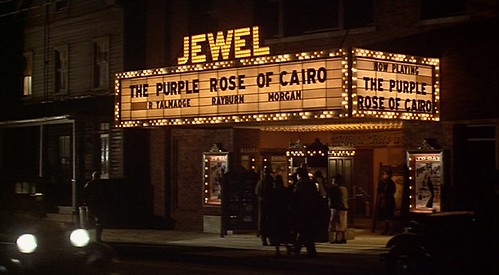
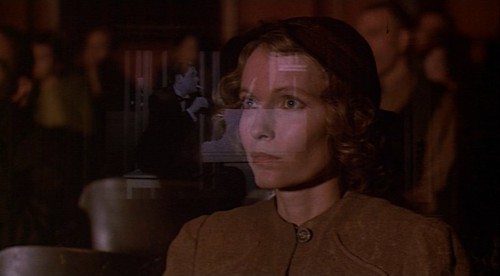
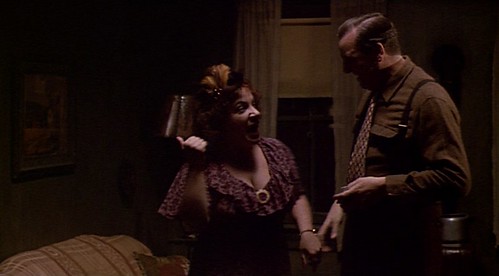
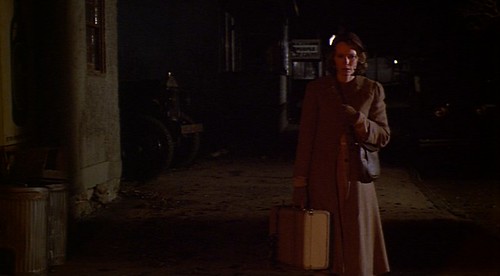
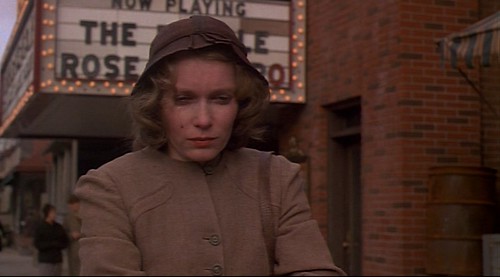
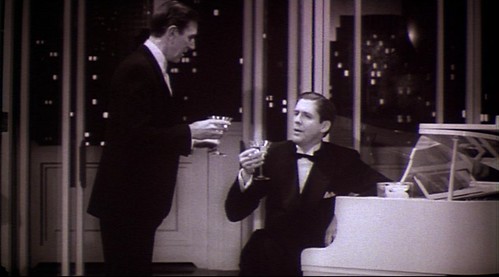
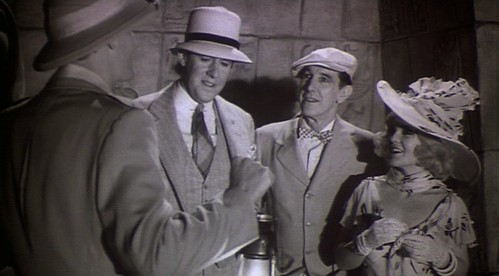
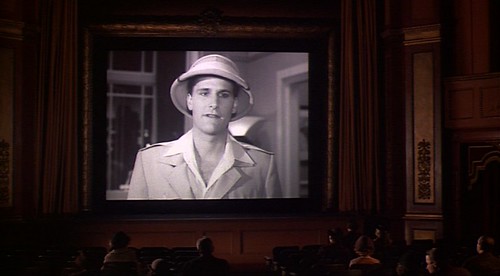
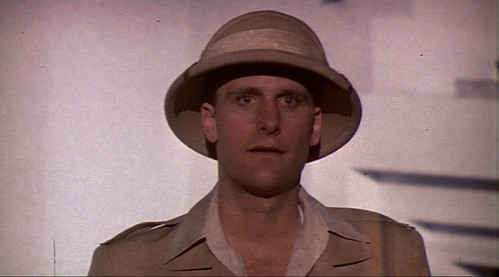


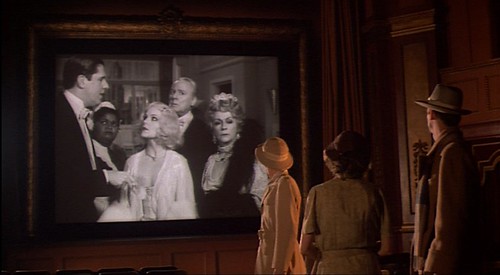
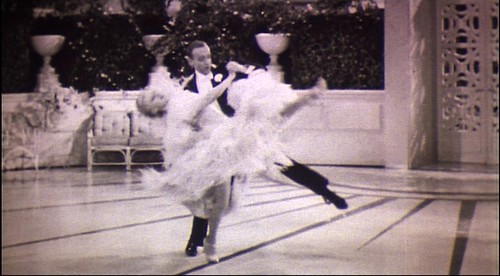
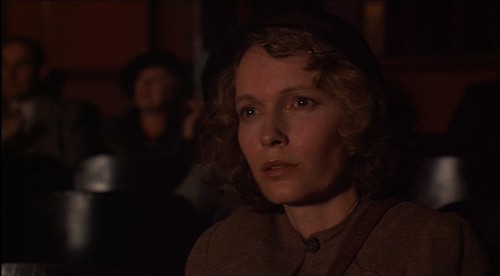
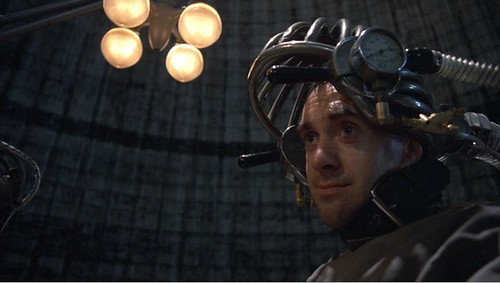
No comments:
Post a Comment